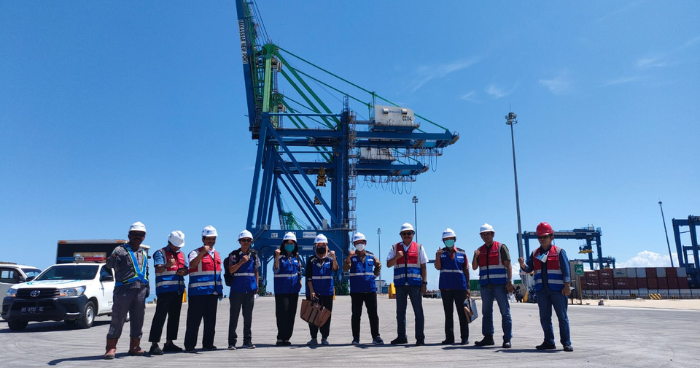Research team offers path to greater diversity for Indonesian ports
A team of Australian and Indonesian researchers has identified the need for more soft skills and gender diversity, for its workforce to have the skills Indonesia needs to achieve its ambitions to become a major sea power.
Prof Alexander Babanin, Dr Elisa Lumantarna and Prof Abbas Rajabifard from FEIT’s Department of Infrastructure Engineering and Professor Muhammad Arysad and colleagues from Hasanuddin University, Indonesia, have co-authored a report titled “Capacity building program in seaport engineering and operation at Makassar New Port.”
The report has been published by the Australia-Indonesia Centre, a bilateral research consortium supported by the governments of Australia and Indonesia, as well as leading universities and industry in both countries.
Together with researchers from Hasanuddin University, the team identified gaps in the knowledge and skills of young workers in port engineering and operations by comparing their existing knowledge and skills with the industry’s expectations.
 Partnership for Australia-Indonesia Research.
Partnership for Australia-Indonesia Research.
They provide recommendations for port operators, education providers and government agencies, including the need for more emphasis on soft skills and a focus on recruiting women in the port sector.
The team found the port workforce is relatively young and male. The proportion of males is 75 per cent among operational workers and 89.47 per cent among those working in engineering. Workers aged 25 to 40 years represent half the number of operational workers, with a significant minority (12.5 per cent) being aged between 15 and 24.
The Port of Makassar is one of Indonesia’s primary ports and has the highest passenger traffic among Indonesian ports and the largest cargo traffic in Sulawesi.
The research focuses on young people, aged 16-30, in the province of South Sulawesi. This is the largest demographic within the Province, which is undergoing significant economic growth. The research project also aimed “to assist in ensuring all young people are able to take advantage of its development opportunities”.
The research findings suggest that while the technical knowledge and abilities of young workers generally meet the basic requirements, there are still general skills and competencies that need improvement, particularly in promoting gender diversity and social inclusiveness.
While focusing on two key areas, the first relating to demographics and the second relating to skills, the report highlights that young port workers have good general capabilities such as technical competencies, technology adaptability and information technology, but there is a lack of soft skills such as foreign language proficiency, time management, professionalism and work ethic.
“The recommendations will be of value for all major Indonesian ports, which face similar challenges and opportunities. After working on this project for the past year, we hope our recommendations will help Indonesia’s port sector to achieve and benefit from a higher skilled and more diverse workforce,” Professor Babanin said.
“There are many opportunities for young people in this exciting and growing sector. If these recommendations are implemented, the sector could achieve higher performance and diversity within a decade.”
Recommendations include:
- Update education curricula with an emphasis on soft skills.
- Include multicultural awareness and ethical reasoning in the formulation of graduate outcomes.
- Open a special recruitment program for women and minority groups.
- Collaborate with university and training institutions to develop capacity-building programs for young people in the port industry.
This report was prepared as part of the Partnership for Australia-Indonesia Research (PAIR)’s ‘Young People and Skills’ program. PAIR is an initiative of the Australia-Indonesia Centre, which is supported by the Australian government and run in partnership with the Indonesian Ministry of Research and Technology, the Indonesian Ministry of Transport, the provincial government of South Sulawesi and many organisations and individuals from communities and industry.
Read the full report here: https://pair.australiaindonesiacentre.org/wp-content/uploads/2023/05/Capacity-building-program-in-seaport-engineering-and-operation-at-Makassar-New-Port_13.04-3-1.pdf